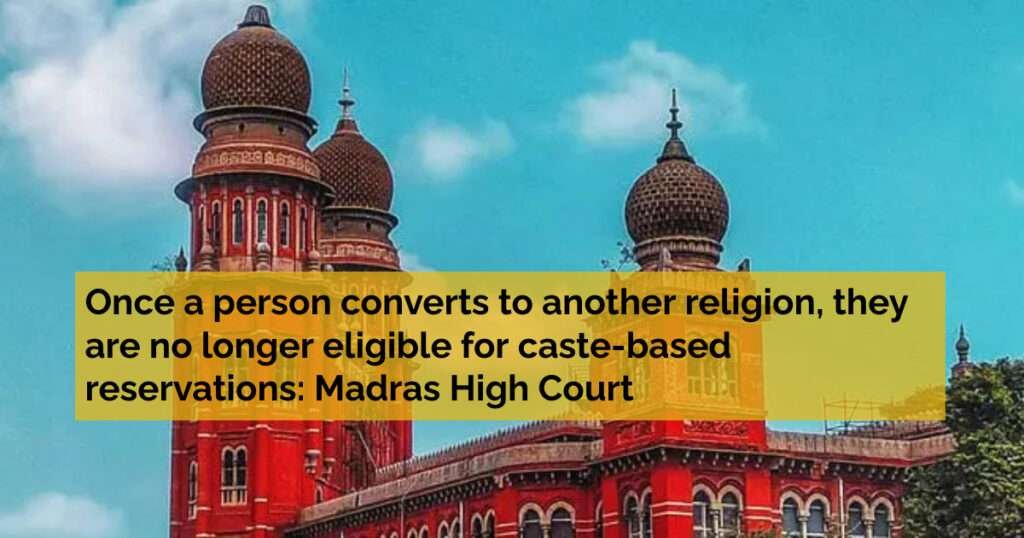Once a person converts to another religion, they are no longer eligible for caste-based reservations: Madras High Court
Justice GR Swaminathan dismissed a petition filed by a Hindu man from the MBC community who converted to Islam seeking caste-based quotas in state jobs.
In U Akbar Ali v. The State of Tamil Nadu and Others, the Madras High Court ruled that a person cannot retain the caste or community he was born into even after converting to another religion or claiming caste-based reservations after converting.
In a decision rendered on December 1, Justice GR Swaminathan of the Madras High Court rejected a claim made by a man who had converted from Hinduism to Islam and sought benefits of reservation based on the community he was born into.
Justice Swaminathan highlighted a number of Supreme Court rulings that found that if a Hindu who has converted to a faith that does not recognise castes would no longer be considered a member of that caste.
The Court also cited the Supreme Court’s ruling in the case of Kailash Sonkar v. Maya Devi, which said that a Hindu’s caste is determined by birth. As a result, converting from Hinduism to Islam, Christianity, or any other religion that does not recognise caste is equivalent to “the loss of the said caste” and that the “original caste remains under eclipse, and as soon as the person is reconverted to the original religion, the eclipse disappears and the caste automatically revives.”
The petitioner had claimed to the High Court that he and his family were Most Backward Class Hindus (MBC). They became Muslims in May 2008. The petitioner took the TN Combined Civil Services Examination in 2018.
He was not selected for the merit list, and the TN Public Service Commission (TNPSC) classified him as a general category applicant rather than a member of the Backward Class Muslim group, according to the response to his RTI request.
He claimed that by becoming an Islamic convert, he had exercised his fundamental right to follow the religion of his choosing. However, he was already a member of the MBC before his conversion, and the State of Tamil Nadu recognised some Muslim groups as being members of the Backward Class.
As a result, he said, the TNPSC ought to have taken his membership in the Backward Class group into account.
The petition was rejected by the state government on the grounds that not all Muslims were considered to be members of the Backward Class by the government of Tamil Nadu.
Justice Swaminathan took note of the arguments and used the Madras High Court’s 2013 decision in S Ruhaiyah Begum v. The State of Tamil Nadu to argue that the entire goal of social justice is lost if a person, even after converting, insists on retaining his prior caste or community’s benefits.
“As observed in S.Yasmine case, a person cannot carry his community of birth even after conversion. Whether such a person should be given the benefit of reservation even after conversion is a question that is pending adjudication before the Hon’ble Supreme Court. When the Hon’ble Supreme Court is seized of the matter, it is not for this Court to uphold the claim of the petitioner. It is for this reason, I am not persuaded by the precedents cited by the learned Senior Counsel appearing for the petitioner. The stand taken by the second respondent Commission is correct. It does not warrant any interference,” the High Court said.
Advocate C Venkatesh Kumar and senior counsel M Ajmalkhan represented the petitioner.
The Tamil Nadu government was represented by Special Government Pleader AK Manikkam and attorney V Panneer Selvam.
Case Title: U Akbar Ali v. The State of Tamil Nadu and Others
Written By: Lakshman Singh, 3rd Semester, B.B.A LL.B (Hons.), Shri Ramswaroop Memorial University, Lucknow


